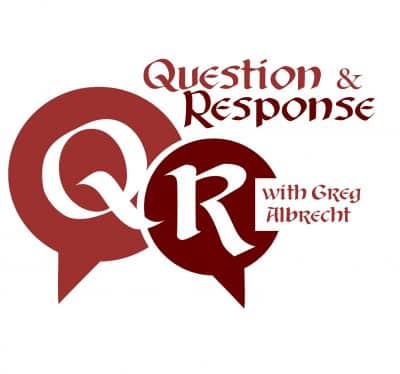Why Ask? Why pray for gifts God has already given? Brad Jersak

“Forgive us our trespasses…”
“Lord, have mercy.”
“Come, Holy Spirit.”
The prayers of God’s people are replete with requests for that which God has already graciously and abundantly provided. So why bother? Is praying for the gifts God has already given an act of unbelief, a confusion of theology or an offense to God? Some seem to think so and in a sense, may be right. But both the question and answer are important and far more nuanced than an either/or knee-jerk reaction. What are the perils and what is the point of asking for what we’ve already been given?
THE PERILS
Two obvious perils accompany requests for forgiveness, mercy and the Holy Spirit—given that all three are among the many examples of God’s outpouring of grace into the world.
The first peril is if we make these requests without understanding or believing that they have happened. It’s a serious omission when our prayers smuggle in the assumption that God has not yet forgiven, not yet been merciful and not yet given the gift of the Spirit. Christ and his apostles could not have been more straightforward: Christ taught that God’s mercy has been given to ALL (“the righteous and the wicked”); on the Cross, Christ forgave ALL (“while we were yet sinners”). And on Pentecost, the Holy Spirit was “poured out on all flesh” (Acts 2). If our prayers imply a negation of these great truths, we’ve made a grave mistake—the main fruit of which is that our invocation devolves into desperate begging and paints God as someone less than our generous heavenly Abba.
The second danger when we ask for what has been given is that in receiving them, we imagine that our prayers actually secured God’s gifts—that praying right or praying long or praying hard somehow caused the forgiveness, mercy or Spirit to come. We then seek to establish a cauldron of correct prayers, incantations or mechanisms to seal the deal. We paint a picture of prayer as an acquisition or transaction rather than a grace-gift from heaven.
Those who become aware of these perils sometimes end up rejecting all such prayers as wrong-headed and develop theologies to avoid them. For example, some of my friends find the Lord’s Prayer offensive because it includes the request for forgiveness. They reason that since the Cross established forgiveness once and for all, that the Lord’s Prayer is inappropriate for New Covenant believers. Some even imagine that all Christ’s instructions to his disciples prior to the Cross should be relegated to the dung heap of the Old Covenant that’s been abolished. Such a leap is shocking and mistaken—I’ll address that misstep in a follow-up post next week.
THE POINT
Still, having noted the perils, we ought to ask, “Then what’s the point? Why pray for that which God has already freely given?”
Again, let’s start with the unwavering conviction that forgiveness is forever and finally established in the “finished work of Christ.” Let’s be unbending in our belief that God’s mercies are a superabundant, infinite spring that never ceases. Let’s acknowledge that the Holy Spirit is everywhere and always present. Then what’s the point of asking? I’m glad you asked.
First, because Jesus said so. He instructs us to pray, “Father, forgive,” invites us to repeatedly ask, seek and knock for mercy and calls us to open our hands to receive Abba’s good gifts, chief of which is the Holy Spirit. As a Christ-follower, I believe no one knows how and why to pray better than our Lord Jesus Christ and his instructions in prayer are the most important ever given—even when I don’t understand the “why?” To think we know better than Christ and explain away his teaching on prayer is, frankly, spiritually silly. But if we need speculate on the “why?” read on:
Second, asking is an act of awareness and belief. Praying, “Father, forgive” reminds us that Abba has indeed done everything necessary to forgive. Praying, “Lord, have mercy” reminds us that “his mercy endures forever.” Praying, “Come, Holy Spirit” reminds us that the Spirit is an indwelling river of living water that flows from within those who believe (John 7:38). Asking asserts our belief that this is who Abba is and what Abba gives.
Third, asking is an orientation of humility and receptivity. It’s not just that we know and believe God is generous—it’s that we posture ourselves to receive the gifts already given. It’s like opening our eyes to see the sun that’s already shining. It’s like opening our mouths to partake of the feast already provided. It’s like turning and opening our hearts to the love that has never once turned from us.
Finally, asking is critical because God is love and love–even God’s love–requires consent. God does not require consent to forgive or show mercy or send the Spirit. God’s unfailing pursuit of his beloved and his relentless wooing continue even without our permission. But at some point, love by nature must wait on our willing “Yes!” or it would be a violation of our God-given freedom. And our love for God is not love if it’s not consensual.
I don’t know where that line falls exactly, and neither do you. I just know that Abba did not even impregnate the Virgin without her willing “Yes.” Mary the mother of Jesus is a beautiful example of perfect surrender to the Father’s love—but so too, in that narrative, Abba demonstrates his commitment to Mary’s consent and ours.
Similarly, prayer, for us, becomes an act of mutual surrender and consent between Christ and his Bride. “Asking prayer” welcomes the goodness of his already-given gifts into our lives. Asking is the Christ-taught means by which we receive those gifts. “Ask and you will receive” forgiveness, you’ll receive mercy and you’ll receive the Holy Spirit. And Abba’s beautiful answer–the answer that Christ voices from the Cross–is simply this: “Consider it done!”










 Plain Truth Ministries | Box 300 | Pasadena, CA 91129-0300
Plain Truth Ministries | Box 300 | Pasadena, CA 91129-0300

